Papers by Abiodun Oluwadare
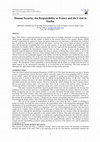
International Affairs and Global Strategy, 2013
Since 2003, Sudan’s central government has used proxy forces to slaughter thousands of civilians ... more Since 2003, Sudan’s central government has used proxy forces to slaughter thousands of civilians belonging to ethnic groups associated with the conflict in Darfur in the western region of that country. Serious outside pressure would likely be required to change the regime preferences for repression, as Khartoum has concluded that, if unchecked, the uprising would threaten the regime’s survival. The war in Darfur has attracted reactions from the international community that even in some quarters; it has been labeled as genocide. The way Khartoum has handled Darfur’s alleged genocide has also not impressed the international community. The development compelled the International Criminal Court to issue a warrant of arrest on the president for allegedly using the janjaweed militias against the innocent citizens of Darfur. The current conflict is one of the most complex war situations which has defied attempts made by the international community to resolve it. The African Union has been ...
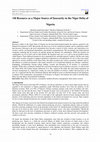
Research on humanities and social sciences, 2013
Resource conflict in the Niger Delta of Nigeria has become hydra-headed despite the amnesty grant... more Resource conflict in the Niger Delta of Nigeria has become hydra-headed despite the amnesty granted by the Federal Government in 2009. Historically, the discovery of oil in commercial quantity and its exploitation rather than become a blessing to the local communities have become a source of worry, tension, and contestation over resource control, environmental degradation, and minority marginalization. The government and multi-national companies exploring the oil resource are pitched against the minority oil communities. While the minority oil communities see oil as God’s gift for their benefit, the Nigerian state sees it as a gift to the geo-political entity called Nigeria. These different perspectives have engendered low and high intensity conflicts with the state using state-centric security strategies to suppress rebellion or opposition to oil exploitation. In view of this state centric approach to security problems in the Niger Delta, this paper examines the various asymmetric ...
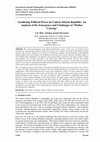
The causes/consequences and dimensions/dynamics mixes of the crisis of political power contestati... more The causes/consequences and dimensions/dynamics mixes of the crisis of political power contestations among groups in Africa in the post cold-war era continue to generate robust debates among scholars. All over the continent, as evinced in the following examples; the Arab Spring of the Maghreb Region (Egypt, Libya and Tunisia), the challenges of ascension into and the retention of political office in the Frontline States (Zimbabwe), the political crisis of cataclysmic proportion in the Horn of Africa (Sudan and Somalia), the recurring imbroglio in the West-Coast (Mali and Liberia) and the never-ending commotion in the Great Lakes Region (Central African Republic) is a pointer to the fact that most African states are yet to device mechanisms through which political power contestations can be the true reflections of the wishes of the critical mass of the people. The ever-bumpy political terrain of the Central African Republic has faced renewed violence since 2012 as a result of the dee...

The African Union and the conflict in Mali : extra-regional influence and the limitations of a regional actor
The role of regional and sub-regional organisations cannot be over stressed in conflict resolutio... more The role of regional and sub-regional organisations cannot be over stressed in conflict resolution, especially in their sphere of influence. The African Union and ECOWAS played prominent roles in places like Burundi, Darfur, Chad, Somalia and Liberia, otherwise the story of the conflicts in these countries would have been different today. It is also well-known that the success achieved in these interventions would not have been forthcoming if the US, EU and EU countries and the United Nations had not given their preponderant support to these regional and sub-regional organisations. In other words, the cooperative, collaborative and supportive understanding between these extra-African bodies and the regional and sub-regional organisations has recorded more success than a unilateral intervention. The support given to ECOWAS in Liberia led to a successful resolution of that country’s war and the AU-UN hybrid operations in Darfur are yielding some kind of modest success. Analysts have p...
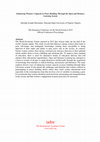
The World Economic Forum reported in 2012 that women make up one half of the world’s human capita... more The World Economic Forum reported in 2012 that women make up one half of the world’s human capital. This study reveals that illiteracy among women often leads to poor self-image, and inadequate knowledge, making them susceptible to being deprived of their rights and ability to play active role in the society. In contrast, literate women express their talents constructively and give direction to their aptitude which enables them to lead a fulfilling and satisfying life. To improve their standard of education, there is need for alternative modes of education delivery that will enhance their educational opportunities. Open and Distance Learning has emerged as a boon to women of all ages to equip themselves intellectually through the acquisition of knowledge that translates to radical thinking, autonomous and liberation. The study explores diverse ways of enhancing women capacity in peace building through Open University system. It also details the challenges and obstacles that women co...
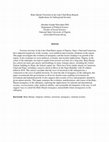
Terrorist activities in the Lake Chad Basin region of Nigeria, Niger, Chad and Cameroon, have imp... more Terrorist activities in the Lake Chad Basin region of Nigeria, Niger, Chad and Cameroon, have impacted negatively on the security, socio-political and economic situations in the region. This paper investigates the evolution of insurgency and the factors leading to its growth in the region. It also examines its socio-political, economic and security implications. Nigeria, in the centre of the imbroglio, has had no respite from terrorist activities for a long time. Boko Haram has carried out many gun attacks and bombings in many strategic places, including the United Nations building in Abuja, the federal capital city. There have been similar attacks in Cameroon, Chad and Niger, including a massive attack in Bosso in the Niger Republic with 26 soldiers killed in 2016. This article concludes that the wave of terrorism in the subregion has a connection to the wave of global terrorism. To stem the tide of insurgency in the subregion, this paper recommends that governments at all levels should create enabling environment for investment and industrial growth. It also suggests that security of lives and properties should be given utmost priority. This paper examines the evolution, manifestations, and course of the Boko Haram insurgency in the subregion, exploring the implications for national and international security, socioeconomic order, political stability, and sustainable development of the area. It will suggest ways to curtail the Boko Haram insurgency and probable future insurgencies in the subregion.
Militancy and Criminality in the Niger Delta Region of Nigeria
Crime, Law and Society in Nigeria
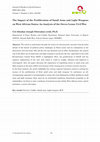
The article is undertaken through the lenses of a documentary narrative that provides details of ... more The article is undertaken through the lenses of a documentary narrative that provides details of the history of political power challenges in Sierra Leone and its culmination in the destructive civil war from 1991 till the war was declared over in 2002. Furthermore, the central role of the illicit use of small arms and light weapons to prosecute the war, especially by the rebel Revolutionary United Front (RUF) is highlighted. Here, the proliferation of SALW and the negative implications of the ease with which it could be sought, obtained and deployed is interrogated. Also, the paper discusses the importance of regulating access to small arms and light weapons in the post-conflict area because of the consequences on future security concerns.In the final analysis, the article highlights the various regional initiatives aimed at curbing the menace of the proliferation of illicit small arms and light weapons. In conclusion, an all-encompassing approach is recommended to ensure the total...
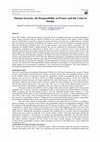
International Affairs and Global Strategy, 2013
Since 2003, Sudan's central government has used proxy forces to slaughter thousands of civilians ... more Since 2003, Sudan's central government has used proxy forces to slaughter thousands of civilians belonging to ethnic groups associated with the conflict in Darfur in the western region of that country. Serious outside pressure would likely be required to change the regime preferences for repression, as Khartoum has concluded that, if unchecked, the uprising would threaten the regime's survival. The war in Darfur has attracted reactions from the international community that even in some quarters; it has been labeled as genocide. The way Khartoum has handled Darfur's alleged genocide has also not impressed the international community. The development compelled the International Criminal Court to issue a warrant of arrest on the president for allegedly using the janjaweed militias against the innocent citizens of Darfur. The current conflict is one of the most complex war situations which has defied attempts made by the international community to resolve it. The African Union has been admirably engaged in the Darfur crisis but has ultimately been ineffectual due to poor resources and weak political will. At the same time, Khartoum intransigence and diplomatic protection provided for it by China has blunted the ambitious steps taken by the United Nations Security Council. However, the crisis in Darfur presents the international community with the opportunity of testing its avowed commitment to human security. The introduction of the responsibility to protect principle into the debate on civilian protection gives an added impetus for the international community to act in protection of the Darfurians. This paper attempts to interrogate the applicability of this concept to the resolution of the conflict in Darfur.
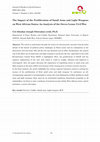
Journal of Studies in Social Sciences, Apr 19, 2014
The article is undertaken through the lenses of a documentary narrative that provides details of ... more The article is undertaken through the lenses of a documentary narrative that provides details of the history of political power challenges in Sierra Leone and its culmination in the destructive civil war from 1991 till the war was declared over in 2002. Furthermore, the central role of the illicit use of small arms and light weapons to prosecute the war, especially by the rebel Revolutionary United Front (RUF) is highlighted. Here, the proliferation of SALW and the negative implications of the ease with which it could be sought, obtained and deployed is interrogated. Also, the paper discusses the importance of regulating access to small arms and light weapons in the post-conflict area because of the consequences on future security concerns. In the final analysis, the article highlights the various regional initiatives aimed at curbing the menace of the proliferation of illicit small arms and light weapons. In conclusion, an allencompassing approach is recommended to ensure the total elimination of illicit dealing in small arms and light weapons; there must be an articulated regulatory framework acceptable to all stakeholders, for there to exist a modicum of national security within West African states, and by extension, a secure sub-region.
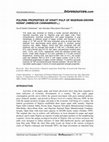
BioResources
This study was centered on finding a locally sourced alternative to imported long-fibre pulp for ... more This study was centered on finding a locally sourced alternative to imported long-fibre pulp for Nigerian pulp and paper mills. Fibre characteristics, chemical composition, and paper properties of pulp handsheets at different levels of kappa number and freeness in the range of 10 oSR and 62 oSR were evaluated using air-dried bast fibre obtained from decorticated kenaf plants grown in southern guinea savanna near Jebba, Nigeria. Kenaf bast fibre compared well with softwood, with an average fibre length of 2.90 mm, a flexibility ratio of 57%, and a Runkel ratio of 0.76. Ash, lignin, and pentosan contents were 0.6%, 12.5%, and 10.6%, respectively, while the cellulose content was 55.5%. Under alkali charge of 15.0 and, sulphidity of 17.5 with constant temperature, cooking time, and liquor-to-fibre ratio of 4.5:1, the screen yield was between 48.8 to 52.8 % with kappa number 12.04 to 20.5. Unbleached pulpsheets at kappa number between 15 and18.5 and pulp freeness 55 oSR and bleached pulp...
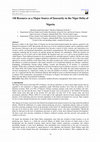
Research on Humanities and Social Sciences, 2013
Resource conflict in the Niger Delta of Nigeria has become hydra-headed despite the amnesty grant... more Resource conflict in the Niger Delta of Nigeria has become hydra-headed despite the amnesty granted by the Federal Government in 2009. Historically, the discovery of oil in commercial quantity and its exploitation rather than become a blessing to the local communities have become a source of worry, tension, and contestation over resource control, environmental degradation, and minority marginalization. The government and multinational companies exploring the oil resource are pitched against the minority oil communities. While the minority oil communities see oil as God's gift for their benefit, the Nigerian state sees it as a gift to the geo-political entity called Nigeria. These different perspectives have engendered low and high intensity conflicts with the state using state-centric security strategies to suppress rebellion or opposition to oil exploitation. In view of this state centric approach to security problems in the Niger Delta, this paper examines the various asymmetric methods used by the militants to counter government's state centric measures. It is revealed that militants use sabotage, vandalism, kidnapping, oil-bunkering, hostage taking, killings, assaults and disruption of oil business as asymmetric methods. While these asymmetric methods have forced government to put in palliative measures, it is discovered that Niger Delta still remains largely militarized. It is, thus, argued in this paper that only proper legislation on resource management in a democratic setting can solve the problem of resource conflict and insecurity in the area. It is suggested that the New Petroleum Industry Bill should be given accelerated hearing by the legislators to enhance local communities' participation in oil business in Nigeria. Government also needs to develop Niger Delta area and address environmental challenges.
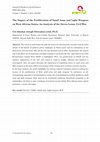
The article is undertaken through the lenses of a documentary narrative that provides details of ... more The article is undertaken through the lenses of a documentary narrative that provides details of the history of political power challenges in Sierra Leone and its culmination in the destructive civil war from 1991 till the war was declared over in 2002. Furthermore, the central role of the illicit use of small arms and light weapons to prosecute the war, especially by the rebel Revolutionary United Front (RUF) is highlighted. Here, the proliferation of SALW and the negative implications of the ease with which it could be sought, obtained and deployed is interrogated. Also, the paper discusses the importance of regulating access to small arms and light weapons in the post-conflict area because of the consequences on future security concerns.
In the final analysis, the article highlights the various regional initiatives aimed at curbing the menace of the proliferation of illicit small arms and light weapons. In conclusion, an all-encompassing approach is recommended to ensure the total elimination of illicit dealing in small arms and light weapons; there must be an articulated regulatory framework acceptable to all stakeholders, for there to exist a modicum of national security within West African states, and by extension, a secure sub-region.
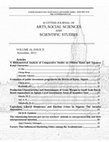
Darfur is an area in the western part of Sudan occupied by mostly Muslims of both black-African a... more Darfur is an area in the western part of Sudan occupied by mostly Muslims of both black-African and Arab-African origins. The region suffered political, economic and social neglect while Sudan was under the control of the Anglo-Egyptian Condominium. The conditions were worsened when Sudan gained independence in 1956, with the institutionalisation of an Arab-supremacy agenda. Though the official policies of neglect and marginalisation affected the whole of Darfur, however, the Arab apartheid policies target only the black-Africans. As the black-African Darfurians sought to redress their situation, they were repelled not just by the authorities in Khartoum, but also by Arab-Darfurians, who had elected to support their kith and kin on the basis of Arab solidarity. The terror unleashed by the combination of government forces and the Arab-Darfur janjaweed militia on black-African Darfurians places the Darfur crisis as one of the greatest human tragedies of the twenty-first century. Under the circumstances, there were questions as to the nature of intervention provided by the United Nations. Remarkably, the UN response was not just slow in coming, it was merely limited to the provision of humanitarian assistance. Pragmatism, as evinced by the politics of the power structure of the permanent membership of the Security Council, and the need for the protection of national self-interest turned the UN into a ‘toothless bull-dog’ while an earth-scorched agenda was being perpetrate in Darfur.
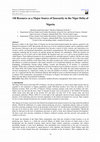
Resource conflict in the Niger Delta of Nigeria has become hydra-headed despite the amnesty grant... more Resource conflict in the Niger Delta of Nigeria has become hydra-headed despite the amnesty granted by the
Federal Government in 2009. Historically, the discovery of oil in commercial quantity and its exploitation rather
than become a blessing to the local communities have become a source of worry, tension, and contestation over
resource control, environmental degradation, and minority marginalization. The government and multi-national
companies exploring the oil resource are pitched against the minority oil communities. While the minority oil
communities see oil as God’s gift for their benefit, the Nigerian state sees it as a gift to the geo-political entity
called Nigeria. These different perspectives have engendered low and high intensity conflicts with the state using
state-centric security strategies to suppress rebellion or opposition to oil exploitation. In view of this state centric
approach to security problems in the Niger Delta, this paper examines the various asymmetric methods used by
the militants to counter government’s state centric measures. It is revealed that militants use sabotage, vandalism,
kidnapping, oil-bunkering, hostage taking, killings, assaults and disruption of oil business as asymmetric
methods. While these asymmetric methods have forced government to put in palliative measures, it is discovered
that Niger Delta still remains largely militarized. It is, thus, argued in this paper that only proper legislation on
resource management in a democratic setting can solve the problem of resource conflict and insecurity in the
area. It is suggested that the New Petroleum Industry Bill should be given accelerated hearing by the legislators
to enhance local communities’ participation in oil business in Nigeria. Government also needs to develop Niger
Delta area and address environmental challenges.
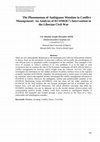
There are two unmistakable dimensions to the immediate post cold-war international relations
in A... more There are two unmistakable dimensions to the immediate post cold-war international relations
in Africa- these are the prevalence of intra-state conflicts, and secondly, the unwillingness of
non-African actors to spearhead conflict management on the continent. Thus emerged a new
wave of recourse to Africa‟s solution to its own problems. It is in the light of such
occurrences that we examine the role of the Economic Community Of West African States in
conflict management by drawing critical insight from the Liberian civil-war. The paper
investigates the motivation for the sudden inclusion of politico-military focus to the regional
economic mandate of ECOWAS. Arguably, the pressing need to restore peace in Liberia and
by extension, ensure sub-regional security encouraged the conflict management adventure of
ECOWAS in Liberia. However, the ambiguous, unclear and unenforceable mandate of the
ECOWAS Monitoring Group (ECOMOG) took the shine off the noble intentions of
ECOWAS. In the final analysis, the war became prolonged and led to avoidable loss of
human lives, civil and social dislocation. The article therefore concludes that while the
ECOMOG machinery was put to adequate use in the second attempt (Sierra-Leone) with
corresponding positive results, Liberia could have avoided an unmitigated disaster if
ECOWAS had proposed and worked through a peace process on the basis of a clear,
enforceable and unambiguous mandate.
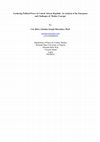
The causes/consequences and dimensions/dynamics mixes of the crisis of political power contestati... more The causes/consequences and dimensions/dynamics mixes of the crisis of political power contestations among groups in Africa in the post cold-war era continue to generate robust debates among scholars. All over the continent, as evinced in the following examples; the Arab Spring of the Maghreb Region (Egypt, Libya and Tunisia), the challenges of ascension into and the retention of political office in the Frontline States (Zimbabwe), the political crisis of cataclysmic proportion in the Horn of Africa (Sudan and Somalia), the recurring imbroglio in the West-Coast (Mali and Liberia) and the never-ending commotion in the Great Lakes Region (Central African Republic) is a pointer to the fact that most African states are yet to device mechanisms through which political power contestations can be the true reflections of the wishes of the critical mass of the people. The ever-bumpy political terrain of the Central African Republic has faced renewed violence since 2012 as a result of the deep ethno/religious cleavages and class inequalities that have existed in the country since independence. The article interrogates the causes and consequences of the crisis that continues to afflict political power contestations in the country. In this effort, the ‘unusual’ solution of electing a woman as the Interim President of the country is our point of departure. This examination is undertaken through the framework of the Feminist Ideology. In the final analysis, the paper argues that the president’s gender played a significant factor in being elected into office. However, the challenges of resolving the crisis in the country is massive, thus, the gender-status of the Interim President cannot be the only factor in the resolution of the conflict. As such, the Central African Republic can only be placed on the path of peace through the concerted efforts of the warring factions and the sincere, unbiased and collective support of the international community.
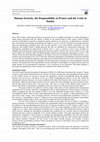
Since 2003, Sudan’s central government has used proxy forces to slaughter thousands of civilians ... more Since 2003, Sudan’s central government has used proxy forces to slaughter thousands of civilians belonging to
ethnic groups associated with the conflict in Darfur in the western region of that country. Serious outside
pressure would likely be required to change the regime preferences for repression, as Khartoum has concluded
that, if unchecked, the uprising would threaten the regime’s survival. The war in Darfur has attracted reactions
from the international community that even in some quarters; it has been labeled as genocide. The way
Khartoum has handled Darfur’s alleged genocide has also not impressed the international community. The
development compelled the International Criminal Court to issue a warrant of arrest on the president for
allegedly using the janjaweed militias against the innocent citizens of Darfur. The current conflict is one of the
most complex war situations which has defied attempts made by the international community to resolve it. The
African Union has been admirably engaged in the Darfur crisis but has ultimately been ineffectual due to poor
resources and weak political will. At the same time, Khartoum intransigence and diplomatic protection provided
for it by China has blunted the ambitious steps taken by the United Nations Security Council. However, the crisis
in Darfur presents the international community with the opportunity of testing its avowed commitment to human
security. The introduction of the responsibility to protect principle into the debate on civilian protection gives an
added impetus for the international community to act in protection of the Darfurians. This paper attempts to
interrogate the applicability of this concept to the resolution of the conflict in Darfur.
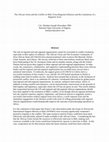
The role of regional and sub-regional organizations cannot be overstated in conflict resolution,
... more The role of regional and sub-regional organizations cannot be overstated in conflict resolution,
especially in their sphere of influence. The African Union and The Economic Community of
West African States (ECOWAS) have played prominent roles in places like Burundi, Darfur,
Chad, Somalia, and Liberia. The success achieved in these interventions would not likely have
been forthcoming if the US, European Union and its member nations, along with the United
Nations had not given their support to these regional and sub-regional organizations. In other
words, the cooperative, collaborative, and supportive understanding between these extra-African
bodies and the regional and sub-regional organizations has recorded more success than a
unilateral intervention. To elaborate, the support given to ECOWAS in Liberia led to a
successful resolution of that country’s war, and the AU-UN hybrid operations in Darfur is
yielding some kind of modest success. Analysts have posited that at present, in the resolution of
protracted conflict, there is no substitute for coherent, coordinated intervention by global power
and regional and sub-regional organizations. In contrast, unilateral intervention, which, in
addition to being wasteful and expensive, can be internationally controversial on the grounds of
both legality and legitimacy, especially where the UN has not given its nod. This article submits
that cooperation between the UN and regional and sub-regional African organizations should
have been applied to the resolution of Mali’s conflict. Even though African regional institutions
lack the required expertise, logistics, diplomatic, and financial muscle to singularly mount a
successful intervention without support from extra-Africa, a swift response from and the
immediate engagement of the Western world in the form of willing partnership with regional
African organizations would dramatically improve the outcome of peacekeeping operations in
Africa.
It is the contention of this paper that France’s late intervention (after the troops of African led
International Support Mission in Mali (AFISMA) were overrun) significantly weakened a
proactive response to the conflict. The same resources used by France could have been more
effectively and efficiently utilized if made available to the African Union. - Considering the fact
that the African Union lacked the resources to effectively intervene in Mali, making such
resources available to the Union would have bolstered its capacity to intervene in Mali. In this
case, cooperation not for that mission alone but future missions could have been achieved.

Uploads
Papers by Abiodun Oluwadare
In the final analysis, the article highlights the various regional initiatives aimed at curbing the menace of the proliferation of illicit small arms and light weapons. In conclusion, an all-encompassing approach is recommended to ensure the total elimination of illicit dealing in small arms and light weapons; there must be an articulated regulatory framework acceptable to all stakeholders, for there to exist a modicum of national security within West African states, and by extension, a secure sub-region.
Federal Government in 2009. Historically, the discovery of oil in commercial quantity and its exploitation rather
than become a blessing to the local communities have become a source of worry, tension, and contestation over
resource control, environmental degradation, and minority marginalization. The government and multi-national
companies exploring the oil resource are pitched against the minority oil communities. While the minority oil
communities see oil as God’s gift for their benefit, the Nigerian state sees it as a gift to the geo-political entity
called Nigeria. These different perspectives have engendered low and high intensity conflicts with the state using
state-centric security strategies to suppress rebellion or opposition to oil exploitation. In view of this state centric
approach to security problems in the Niger Delta, this paper examines the various asymmetric methods used by
the militants to counter government’s state centric measures. It is revealed that militants use sabotage, vandalism,
kidnapping, oil-bunkering, hostage taking, killings, assaults and disruption of oil business as asymmetric
methods. While these asymmetric methods have forced government to put in palliative measures, it is discovered
that Niger Delta still remains largely militarized. It is, thus, argued in this paper that only proper legislation on
resource management in a democratic setting can solve the problem of resource conflict and insecurity in the
area. It is suggested that the New Petroleum Industry Bill should be given accelerated hearing by the legislators
to enhance local communities’ participation in oil business in Nigeria. Government also needs to develop Niger
Delta area and address environmental challenges.
in Africa- these are the prevalence of intra-state conflicts, and secondly, the unwillingness of
non-African actors to spearhead conflict management on the continent. Thus emerged a new
wave of recourse to Africa‟s solution to its own problems. It is in the light of such
occurrences that we examine the role of the Economic Community Of West African States in
conflict management by drawing critical insight from the Liberian civil-war. The paper
investigates the motivation for the sudden inclusion of politico-military focus to the regional
economic mandate of ECOWAS. Arguably, the pressing need to restore peace in Liberia and
by extension, ensure sub-regional security encouraged the conflict management adventure of
ECOWAS in Liberia. However, the ambiguous, unclear and unenforceable mandate of the
ECOWAS Monitoring Group (ECOMOG) took the shine off the noble intentions of
ECOWAS. In the final analysis, the war became prolonged and led to avoidable loss of
human lives, civil and social dislocation. The article therefore concludes that while the
ECOMOG machinery was put to adequate use in the second attempt (Sierra-Leone) with
corresponding positive results, Liberia could have avoided an unmitigated disaster if
ECOWAS had proposed and worked through a peace process on the basis of a clear,
enforceable and unambiguous mandate.
ethnic groups associated with the conflict in Darfur in the western region of that country. Serious outside
pressure would likely be required to change the regime preferences for repression, as Khartoum has concluded
that, if unchecked, the uprising would threaten the regime’s survival. The war in Darfur has attracted reactions
from the international community that even in some quarters; it has been labeled as genocide. The way
Khartoum has handled Darfur’s alleged genocide has also not impressed the international community. The
development compelled the International Criminal Court to issue a warrant of arrest on the president for
allegedly using the janjaweed militias against the innocent citizens of Darfur. The current conflict is one of the
most complex war situations which has defied attempts made by the international community to resolve it. The
African Union has been admirably engaged in the Darfur crisis but has ultimately been ineffectual due to poor
resources and weak political will. At the same time, Khartoum intransigence and diplomatic protection provided
for it by China has blunted the ambitious steps taken by the United Nations Security Council. However, the crisis
in Darfur presents the international community with the opportunity of testing its avowed commitment to human
security. The introduction of the responsibility to protect principle into the debate on civilian protection gives an
added impetus for the international community to act in protection of the Darfurians. This paper attempts to
interrogate the applicability of this concept to the resolution of the conflict in Darfur.
especially in their sphere of influence. The African Union and The Economic Community of
West African States (ECOWAS) have played prominent roles in places like Burundi, Darfur,
Chad, Somalia, and Liberia. The success achieved in these interventions would not likely have
been forthcoming if the US, European Union and its member nations, along with the United
Nations had not given their support to these regional and sub-regional organizations. In other
words, the cooperative, collaborative, and supportive understanding between these extra-African
bodies and the regional and sub-regional organizations has recorded more success than a
unilateral intervention. To elaborate, the support given to ECOWAS in Liberia led to a
successful resolution of that country’s war, and the AU-UN hybrid operations in Darfur is
yielding some kind of modest success. Analysts have posited that at present, in the resolution of
protracted conflict, there is no substitute for coherent, coordinated intervention by global power
and regional and sub-regional organizations. In contrast, unilateral intervention, which, in
addition to being wasteful and expensive, can be internationally controversial on the grounds of
both legality and legitimacy, especially where the UN has not given its nod. This article submits
that cooperation between the UN and regional and sub-regional African organizations should
have been applied to the resolution of Mali’s conflict. Even though African regional institutions
lack the required expertise, logistics, diplomatic, and financial muscle to singularly mount a
successful intervention without support from extra-Africa, a swift response from and the
immediate engagement of the Western world in the form of willing partnership with regional
African organizations would dramatically improve the outcome of peacekeeping operations in
Africa.
It is the contention of this paper that France’s late intervention (after the troops of African led
International Support Mission in Mali (AFISMA) were overrun) significantly weakened a
proactive response to the conflict. The same resources used by France could have been more
effectively and efficiently utilized if made available to the African Union. - Considering the fact
that the African Union lacked the resources to effectively intervene in Mali, making such
resources available to the Union would have bolstered its capacity to intervene in Mali. In this
case, cooperation not for that mission alone but future missions could have been achieved.
In the final analysis, the article highlights the various regional initiatives aimed at curbing the menace of the proliferation of illicit small arms and light weapons. In conclusion, an all-encompassing approach is recommended to ensure the total elimination of illicit dealing in small arms and light weapons; there must be an articulated regulatory framework acceptable to all stakeholders, for there to exist a modicum of national security within West African states, and by extension, a secure sub-region.
Federal Government in 2009. Historically, the discovery of oil in commercial quantity and its exploitation rather
than become a blessing to the local communities have become a source of worry, tension, and contestation over
resource control, environmental degradation, and minority marginalization. The government and multi-national
companies exploring the oil resource are pitched against the minority oil communities. While the minority oil
communities see oil as God’s gift for their benefit, the Nigerian state sees it as a gift to the geo-political entity
called Nigeria. These different perspectives have engendered low and high intensity conflicts with the state using
state-centric security strategies to suppress rebellion or opposition to oil exploitation. In view of this state centric
approach to security problems in the Niger Delta, this paper examines the various asymmetric methods used by
the militants to counter government’s state centric measures. It is revealed that militants use sabotage, vandalism,
kidnapping, oil-bunkering, hostage taking, killings, assaults and disruption of oil business as asymmetric
methods. While these asymmetric methods have forced government to put in palliative measures, it is discovered
that Niger Delta still remains largely militarized. It is, thus, argued in this paper that only proper legislation on
resource management in a democratic setting can solve the problem of resource conflict and insecurity in the
area. It is suggested that the New Petroleum Industry Bill should be given accelerated hearing by the legislators
to enhance local communities’ participation in oil business in Nigeria. Government also needs to develop Niger
Delta area and address environmental challenges.
in Africa- these are the prevalence of intra-state conflicts, and secondly, the unwillingness of
non-African actors to spearhead conflict management on the continent. Thus emerged a new
wave of recourse to Africa‟s solution to its own problems. It is in the light of such
occurrences that we examine the role of the Economic Community Of West African States in
conflict management by drawing critical insight from the Liberian civil-war. The paper
investigates the motivation for the sudden inclusion of politico-military focus to the regional
economic mandate of ECOWAS. Arguably, the pressing need to restore peace in Liberia and
by extension, ensure sub-regional security encouraged the conflict management adventure of
ECOWAS in Liberia. However, the ambiguous, unclear and unenforceable mandate of the
ECOWAS Monitoring Group (ECOMOG) took the shine off the noble intentions of
ECOWAS. In the final analysis, the war became prolonged and led to avoidable loss of
human lives, civil and social dislocation. The article therefore concludes that while the
ECOMOG machinery was put to adequate use in the second attempt (Sierra-Leone) with
corresponding positive results, Liberia could have avoided an unmitigated disaster if
ECOWAS had proposed and worked through a peace process on the basis of a clear,
enforceable and unambiguous mandate.
ethnic groups associated with the conflict in Darfur in the western region of that country. Serious outside
pressure would likely be required to change the regime preferences for repression, as Khartoum has concluded
that, if unchecked, the uprising would threaten the regime’s survival. The war in Darfur has attracted reactions
from the international community that even in some quarters; it has been labeled as genocide. The way
Khartoum has handled Darfur’s alleged genocide has also not impressed the international community. The
development compelled the International Criminal Court to issue a warrant of arrest on the president for
allegedly using the janjaweed militias against the innocent citizens of Darfur. The current conflict is one of the
most complex war situations which has defied attempts made by the international community to resolve it. The
African Union has been admirably engaged in the Darfur crisis but has ultimately been ineffectual due to poor
resources and weak political will. At the same time, Khartoum intransigence and diplomatic protection provided
for it by China has blunted the ambitious steps taken by the United Nations Security Council. However, the crisis
in Darfur presents the international community with the opportunity of testing its avowed commitment to human
security. The introduction of the responsibility to protect principle into the debate on civilian protection gives an
added impetus for the international community to act in protection of the Darfurians. This paper attempts to
interrogate the applicability of this concept to the resolution of the conflict in Darfur.
especially in their sphere of influence. The African Union and The Economic Community of
West African States (ECOWAS) have played prominent roles in places like Burundi, Darfur,
Chad, Somalia, and Liberia. The success achieved in these interventions would not likely have
been forthcoming if the US, European Union and its member nations, along with the United
Nations had not given their support to these regional and sub-regional organizations. In other
words, the cooperative, collaborative, and supportive understanding between these extra-African
bodies and the regional and sub-regional organizations has recorded more success than a
unilateral intervention. To elaborate, the support given to ECOWAS in Liberia led to a
successful resolution of that country’s war, and the AU-UN hybrid operations in Darfur is
yielding some kind of modest success. Analysts have posited that at present, in the resolution of
protracted conflict, there is no substitute for coherent, coordinated intervention by global power
and regional and sub-regional organizations. In contrast, unilateral intervention, which, in
addition to being wasteful and expensive, can be internationally controversial on the grounds of
both legality and legitimacy, especially where the UN has not given its nod. This article submits
that cooperation between the UN and regional and sub-regional African organizations should
have been applied to the resolution of Mali’s conflict. Even though African regional institutions
lack the required expertise, logistics, diplomatic, and financial muscle to singularly mount a
successful intervention without support from extra-Africa, a swift response from and the
immediate engagement of the Western world in the form of willing partnership with regional
African organizations would dramatically improve the outcome of peacekeeping operations in
Africa.
It is the contention of this paper that France’s late intervention (after the troops of African led
International Support Mission in Mali (AFISMA) were overrun) significantly weakened a
proactive response to the conflict. The same resources used by France could have been more
effectively and efficiently utilized if made available to the African Union. - Considering the fact
that the African Union lacked the resources to effectively intervene in Mali, making such
resources available to the Union would have bolstered its capacity to intervene in Mali. In this
case, cooperation not for that mission alone but future missions could have been achieved.